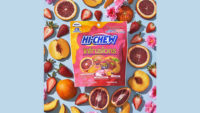The Chew

According to researchers, participants in the study who practiced excess chewing with their lunches were found to consume 50% less snacks throughout the remainder of the day.
The study was performed by researchers at the University of Birmingham and published in the journal Appetite.
An article by The New Age writes that the study was conducted using 43 participants,predominately female. The group was instructed not to consume food for two hours prior to the test. Subjects were then given a sandwich for lunch with part of the group being asked to chew each bite for at least 30 seconds before swallowing.
When two hours had elapsed, the entire test group was offered several sweet or salty snack options. Researchers found that the participants who chewed their lunches slowly ate half as many of the offered snacks as those who ate their food at a normal chewing pace.
According to The Daily Mail, the reason for the reduced snacking may come from the concentration required to effectively chew each bite for 30 seconds. It is possible the extra chewing causes the brain to “remember” the act of eating for further into the day and prevents it from sending hunger signals..
The researchers also speculate that the unpleasantness of 30 second chewing may be a factor:
“Participants in the prolonged chewing group were less happy after lunch and had reduced ratings of lunch enjoyment, and pleasantness of the texture of lunch, compared with others. These effects may be due to the novelty of prolonged chewing, or reduced palatability of the food. Because the participants did not particularly enjoy the lunch experience, this may have affected decisions about how many sweets to eat later.”
Looking for a reprint of this article?
From high-res PDFs to custom plaques, order your copy today!





